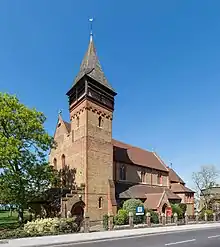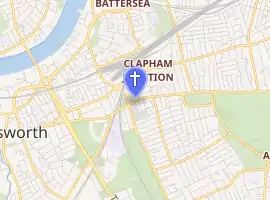St Mark's, Battersea Rise
St Mark's, Battersea Rise is a Victorian Grade II* listed Anglican church located in Clapham Junction in London.[1] The church was designed by William White and built from 1872–74 in a Geometric Middle-pointed, 13th Century Gothic style[2] using yellow bricks with red brick dressings and diapering.[1] Inside, the nave comprises four bays with north aisles, a tower at the south-west corner supporting a wooden belfry and a shingled spire.[1] Concrete piers with naturalistic stone-carved capitals were produced by Harry Hems. The interior floor is tiled. The choir stalls, pulpit and font were built to White's designs. The altar is raised on a stone plinth behind low brass rails. At the east end, the ambulatory descends to the crypt.[1]
| St Mark's, Battersea Rise | |
|---|---|
 St Mark's viewed from Battersea Rise | |

| |
| 51.4604°N 0.1702°W | |
| Location | Battersea Rise, London |
| Country | United Kingdom |
| Denomination | Church of England |
| Churchmanship | Conservative Evangelical |
| Website | http://www.stmarks-battersea.org.uk |
| Architecture | |
| Architect(s) | William White |
| Style | Victorian Gothic |
| Years built | 1874 |
| Administration | |
| Diocese | Diocese of Southwark |
| Clergy | |
| Vicar(s) | The Revd Martyn Layzell |
| Curate(s) | The Revd Mark Thomas |
After a declining congregation and a dilapidated church building, the parish recovered as the result of a church plant in 1987 from Holy Trinity Brompton, led by Pastor Paul Perkin, his wife Christine and a group of about 50 followers.[3] Through donations from the congregation, building works have been undertaken, with a new welcome hall and extended meeting hall opened in 2007.
St Mark's Church has been described as conservative and evangelical and was the subject of an article by The Guardian newspaper in 2012, Money becomes new church battleground.[4] The article describes a "bitter power struggle within the CofE and the wider Anglican communion" on conservative issues such as homosexuality and the ordination of women priests.
Boutflower Road, which runs to the east of the church, is named for Henry Boutflower Verdon, the church's first vicar-designate who died, young, in 1879, seven years before the construction of the road as part of Alfred Heaver's St John's Park property development.[5]
References
- "Images of England". Retrieved 17 April 2014.
- "British Images Online". Retrieved 17 April 2014.
- "St Mark's, Battersea Rise – History".
- Brown, Andrew (17 May 2012). "Money becomes new church battleground". The Guardian.
- "15". Survey of London 50: Battersea (draft) (PDF). English Heritage / Yale University Press. 2013. p. 13.
| Wikimedia Commons has media related to St Mark's, Battersea Rise. |